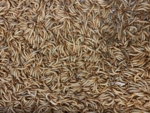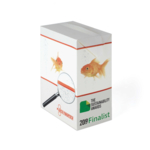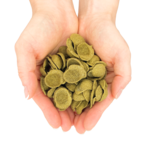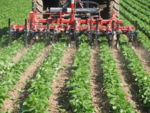-
-
-
Press release - 27/05/2021
The pulp of coffee beans is considered a waste product on coffee plantations, which is usually thrown away or dumped into rivers - with significant negative consequences for climate change and the environment. Macarena San Martín-Ruiz from the University of Stuttgart is working with Coopetarrazú, the largest coffee cooperative in Costa Rica, to find out how the mixture of pulp and husks can be turned into organic compost and thus protect the…
https://www.biooekonomie-bw.de/en/articles/pm/coffee-s-pulp-waste-becomes-organic-compost
-
Press release - 18/05/2021
The Bio-based Industries Joint Undertaking (BBI JU) has signed the grant agreements with 18 new projects, selected for funding under the 2020 Call for proposals. 199 beneficiaries from 26 countries across the EU and beyond will receive BBI JU’s financial support worth €104.5 million. This is the seventh and last BBI JU call which will bring the total investment of the initiative to €821.6 million and the BBI JU’s portfolio to 142 projects.
https://www.biooekonomie-bw.de/en/articles/pm/bbi-ju-invest-eur1045-million-circular-bio-based-projects
-
Press release - 03/05/2021
The amount of plastic waste increases every year. Some of this waste is due to plastic packaging used to protect food. As part of the “BioActiveMaterials” project, researchers at the Fraunhofer-Gesellschaft have developed an eco-friendly coating for paper packaging. With this, not only is plastic saved, but the coating of plant-based proteins and waxes also extends the shelf life of the food.
https://www.biooekonomie-bw.de/en/articles/pm/bioactive-paper-coatings-replace-plastic-packaging-foods
-
-
-
-
-
Alternative source of protein - 07/04/2021

It is estimated that by 2050, if not before, the world's population will have grown so much that it will be difficult to provide adequate supplies of food for everyone. It is therefore high time to look for alternatives. One option could be insects as an environmentally friendly source of protein for humans and animals. The start-up company Cepri is developing smart insect farms with the goal to make primary production, which is not yet…
https://www.biooekonomie-bw.de/en/articles/news/smart-insect-farms-sustainable-protein-sources-future
-
-
-
-
Paper technology - 10/03/2021

Plastic is indispensable: it is cheap and practical and found in many disposable products such as drinking straws, disposable tableware or even packaging like bonded beverage cartons or bags – and it has a disastrous effect on the environment. The start-up company Plafco Fibertech Oy has developed a sustainable plastic substitute made of paper that could replace many disposable plastic products in the future.
https://www.biooekonomie-bw.de/en/articles/news/plafco-sustainable-plastic-substitute-made-paper
-
-
Press release - 23/02/2021
The European Commission agreed on the successor of BBI JU – the Circular Bio-based Europe Joint Undertaking (CBE JU) in a legislative proposal adopted today. The new partnership between the EU and the Bio-based Industries Consortium (BIC) is expected to build on the success of BBI JU while stepping up its contribution to the EU’s climate targets, in line with the European Green Deal. The European Parliament and Council will now study the…
https://www.biooekonomie-bw.de/en/articles/pm/commission-gives-green-light-successor-bbi-ju
-
-
-
-
-
-
Paper production from plant fibres - 20/01/2021

Many consumers don't care about exactly how their paper packaging is made and what it is made of as long as it is "eco". But even producing recycled paper, trees need to be felled. An alternative could be paper made from cup plant. Together with partners, a company called Silphie Paper has developed concept for obtaining fibres for a new type of grass paper, while also producing heat, energy and nutrients for natural fertilisers.
https://www.biooekonomie-bw.de/en/articles/news/one-cycle-ecopaper-energy-and-fertiliser-made-silphium-perfoliatum
-
Press release - 04/01/2021
As healthy and tasty as mushrooms might be, they are good for much more than just the dinner plate. The Fraunhofer Institute for Environmental, Safety and Energy Technology UMSICHT has now teamed up with the Fraunhofer Institute for Building Physics IBP to investigate the use of fungus-based materials for the fabrication of eco-friendly sound absorbers.
https://www.biooekonomie-bw.de/en/articles/pm/Fungus-as-a-sound-absorber
-
-
Development of biogenic packaging - 16/11/2020

Modern packaging often boils down to a tick list of biogenic origin and/or biodegradability. But comprehensive sustainable packaging concepts need more than just that. Perishable foods, for example, require special barrier properties. The Albstadt-Sigmaringen University of Applied Sciences is researching packaging concepts for their sustainability.
https://www.biooekonomie-bw.de/en/articles/news/sustainable-packaging-devil-detail
Website address: https://www.biooekonomie-bw.de/en/search







